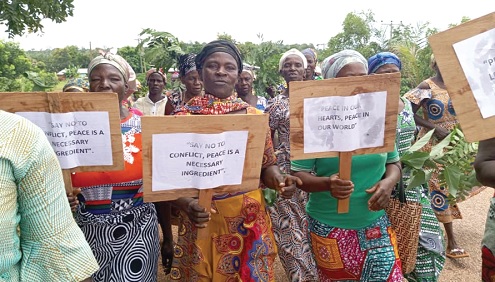Women protest against Bunkpurugu-Nakpanduri clashes

Women from conflict-prone communities in the Bunkpurugu-Nakpanduri District in the North East Region have staged a peaceful protest to demand an immediate end to the recurring clashes that are taking a toll on residents of the area.
On the four-kilometre walk from Gbebruk to Bimbagu, the women chanted peace songs, waved branches, and carried placards with inscriptions such as “Say No to Conflict”, “Peace is a Gift to Humanity”, and “Allow Peace a Chance—We Need One Another”.
The initiative, organised by the Yennutona Foundation women’s group, sought to amplify women’s voices in peacebuilding and create a pathway for stakeholder engagement towards a lasting solution to the conflicts.
Incident
For years, the Bunkpurugu-Nakpanduri District has been plagued by violent conflicts, largely driven by chieftaincy and communal disputes.
These clashes have claimed dozens of lives, destroyed livelihoods and property, and displaced about 1,500 people.
In January 2024, violence broke out at Ngagma-Gbebruk following a dispute over the installation of rival chiefs by the Chief of Binde.
The clashes, which raged for three days, left two people dead and more than 500 displaced.
Over 150 homes were torched, while 5,000 sacks of stored food were destroyed, leaving victims, especially women and children, without sufficient food for days.
In February 2024, three people — including a 27-year-old teacher, Nashiru Maijida, who had been posted to Nanik village the previous year — died in a renewed chieftaincy clash.
The recurring violence also disrupted education in the area, with the Ghana Education Service (GES) forced to suspend academic work in 21 primary schools in the Bimbagu Circuit alone.
This left hundreds of children temporary out of school and deepened the already fragile educational system in the area.
Recounting her ordeal, a victim and resident of Bimbagu, Olivia Duut, said her family narrowly escaped death when their home was set ablaze during a recent clash.
“All our belongings were burnt to ashes, and my husband was chased to be killed, but he managed to escape to the south.
“I was the only bread baker in the community, but all my equipment was destroyed, leaving me helpless,” she said.
Another affected woman, Bawah Gatrika, said she lost her 36-year-old son in one of the attacks.
“I watched helplessly as my son, who was the provider of the home, was killed. I was spared only because I am a woman. Women suffer most in times of conflict; we are left vulnerable, displaced, and dependent on help from others,” she lamented.
She added that the frequent clashes had negatively impacted socio-economic activities in the area.
Mrs Gatrika said farming, the mainstay of the people, had been affected as farmers were unable to access their fields for fear of their lives during renewed attacks.
She appealed to the government and the Overlord of Mamprugu to help resolve the recurring conflicts that were taking a toll on the lives of the people in the area.
Commendation
Responding to the concerns, a Sub-Chief of Bimbagu, Dubik Saman, commended the women for their courage, describing their action as a vital step towards reconciliation.
“Our women want to cool down the grounds for dialogue to begin.
The feuding factions must be brought together to talk.
If I invite them alone, they may not come; the same if they invite me.
Somebody has to take the lead, and the women have shown the way,” he said.
He, therefore, pledged his outfit’s commitment to working with stakeholders to pursue dialogue and bring sustainable peace to the area.



